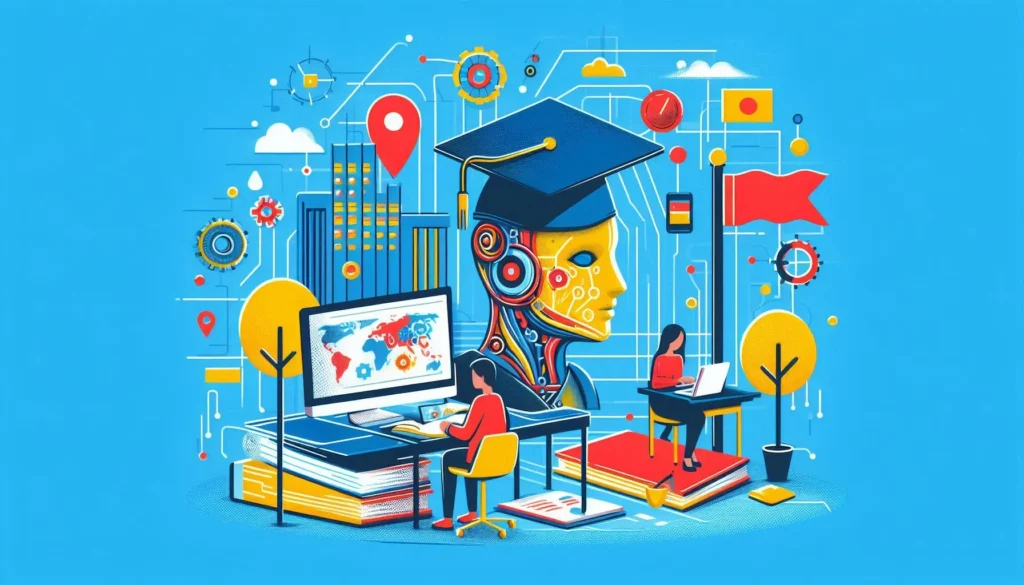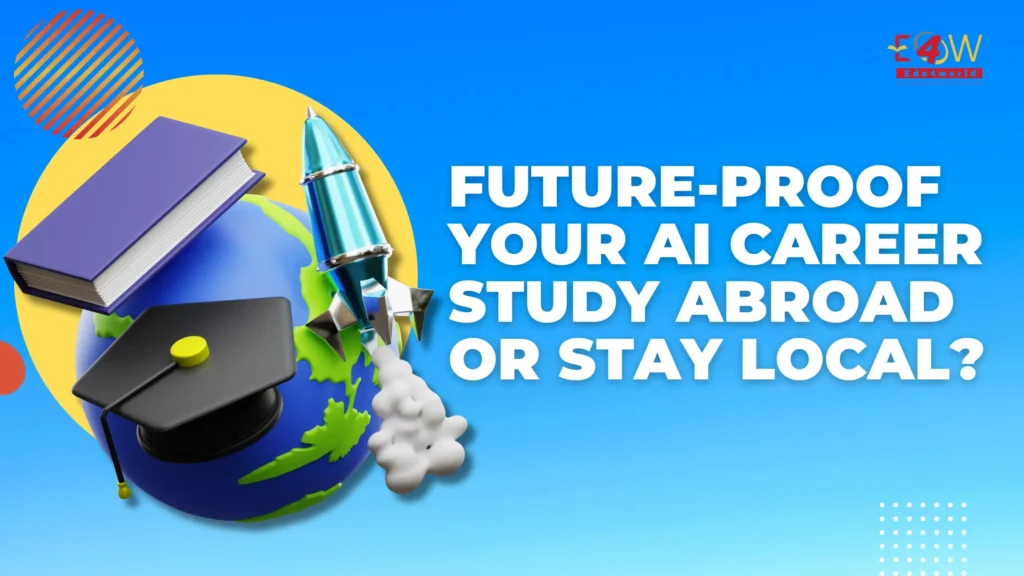Are you at a crossroads in your AI career journey? The decision to study abroad or stay local can be a game-changer, shaping not just your education but your entire professional future. With the AI landscape evolving at breakneck speed, choosing the right path has never been more crucial—or more challenging.
Imagine standing at the forefront of AI innovation, armed with cutting-edge knowledge and a global network. Or picture yourself deeply rooted in your local tech ecosystem, leveraging intimate market insights. Both paths offer unique advantages, but which one will truly future-proof your AI career?
In this comprehensive guide, we’ll navigate the complex terrain of AI education choices. From understanding the global AI landscape to evaluating programs and considering financial implications, we’ll equip you with the insights needed to make an informed decision. Whether you’re drawn to the allure of international exposure or the comfort of familiar ground, join us as we explore how to position yourself for success in the ever-evolving world of artificial intelligence.
Table of Contents
Understanding the Global AI Landscape

Current Trends in AI Job Markets Worldwide
The global AI job market is experiencing unprecedented growth, with demand for skilled professionals outpacing supply. Here are some key trends:
- Increasing job openings across industries
- Rising salaries for AI specialists
- Emphasis on interdisciplinary skills
- Growing demand for AI ethics experts
- Surge in remote work opportunities
| Region | Top AI Job Sectors |
|---|---|
| North America | Tech, Healthcare, Finance |
| Europe | Manufacturing, Automotive, Research |
| Asia | E-commerce, Robotics, Smart Cities |
Emerging AI Hubs and Their Specializations
Several cities worldwide are establishing themselves as AI powerhouses, each with unique focus areas:
- Silicon Valley: General AI, Machine Learning
- Toronto: Deep Learning, Computer Vision
- London: FinTech AI, Natural Language Processing
- Singapore: Smart City Solutions, Predictive Analytics
- Shenzhen: AI Hardware, IoT Integration
Comparing AI Career Opportunities: Local vs. International
When considering AI career paths, it’s crucial to weigh local and international options:
- Local Opportunities:
- Familiarity with market dynamics
- Established professional networks
- Cultural alignment
- International Prospects:
- Exposure to diverse AI applications
- Access to cutting-edge research
- Global networking opportunities
Ultimately, the choice between local and international AI careers depends on personal goals, specialization interests, and desired work environments. As we explore the benefits of studying AI abroad, you’ll gain further insights into the global landscape of AI education and career development.
Benefits of Studying AI Abroad

Exposure to Diverse AI Applications and Perspectives
Studying AI abroad opens doors to a wealth of diverse applications and perspectives that can significantly enrich your understanding of the field. Different countries and cultures approach AI challenges uniquely, offering fresh insights and innovative solutions.
Global AI Use Cases:
- Healthcare diagnostics in Japan
- Smart city initiatives in Singapore
- Financial fraud detection in Switzerland
- Agricultural automation in Israel
Access to Cutting-Edge Research Facilities
Many international institutions boast state-of-the-art AI research facilities, providing students with hands-on experience with the latest technologies.
| Country | Notable AI Research Facilities |
|---|---|
| USA | MIT Media Lab, Stanford AI Lab |
| UK | Alan Turing Institute |
| Canada | Vector Institute |
| China | Beijing Academy of AI |
Building an International Professional Network
Studying abroad allows you to forge connections with peers, professors, and industry professionals from around the world. This global network can prove invaluable for future collaborations, job opportunities, and staying abreast of international AI trends.
Enhancing Cross-Cultural Communication Skills
Immersing yourself in a foreign environment hones your ability to communicate effectively across cultural boundaries – a crucial skill in the increasingly globalized AI industry. You’ll learn to:
- Adapt to different work cultures
- Navigate language barriers in technical discussions
- Understand diverse ethical perspectives on AI implementation
These experiences not only bolster your AI expertise but also make you a more well-rounded and adaptable professional, ready to tackle global AI challenges.
Advantages of Staying Local for AI Education
Leveraging Existing Connections and Industry Partnerships
Staying local for your AI education offers unique advantages, especially when it comes to leveraging existing connections and industry partnerships. These relationships can significantly boost your career prospects and provide valuable real-world experience.
- Networking opportunities with local AI professionals
- Access to internships and job placements through university partnerships
- Participation in local AI meetups and conferences
- Potential for collaborative research projects with local companies
Reduced Costs and Familiar Environment
Choosing to study AI in your home country can lead to substantial cost savings and a smoother transition into advanced studies:
| Cost Factor | Local Study | Study Abroad |
|---|---|---|
| Tuition | Often lower | Generally higher |
| Living Expenses | Familiar costs | Potentially higher |
| Travel | Minimal | Significant |
| Time to Adapt | Minimal | Months |
Understanding Local AI Regulations and Ethical Frameworks
Familiarity with local AI regulations and ethical considerations is crucial for a successful career:
- In-depth knowledge of national AI policies and guidelines
- Understanding of regional data protection laws (e.g., GDPR in Europe)
- Awareness of local ethical concerns and cultural nuances in AI implementation
Tailoring Skills to Regional Market Demands
Staying local allows you to align your AI skills with specific regional needs:
- Focus on industries dominant in your area (e.g., finance in New York, tech in Silicon Valley)
- Develop expertise in AI applications relevant to local businesses
- Build a portfolio that resonates with nearby employers
By staying local, you can tailor your AI education to meet the unique demands of your regional job market, potentially giving you a competitive edge in your home country’s AI industry.
Evaluating AI Programs: Key Factors to Consider
Curriculum Relevance and Industry Alignment
When evaluating AI programs, it’s crucial to assess how well the curriculum aligns with current industry trends and future projections. Look for programs that offer:
- Cutting-edge coursework in machine learning, deep learning, and natural language processing
- Hands-on experience with popular AI frameworks and tools
- Capstone projects that simulate real-world AI challenges
| Industry-Aligned Features | Benefits |
|---|---|
| Up-to-date tech stack | Immediate job readiness |
| Industry partnerships | Networking opportunities |
| Guest lectures by experts | Insider insights |
Faculty Expertise and Research Opportunities
The quality of faculty can significantly impact your learning experience and future prospects. Consider:
- Professors’ publication records in top AI conferences
- Ongoing research projects and potential for student involvement
- Collaboration opportunities with industry partners
Internship and Job Placement Rates
A program’s ability to connect students with valuable work experiences is paramount. Evaluate:
- Percentage of students securing AI-related internships
- Average time to full-time employment post-graduation
- Quality of company partnerships for placements
Alumni Success Stories and Career Trajectories
Examining the career paths of program graduates can provide insights into potential outcomes. Look for:
- Profiles of successful alumni in leadership positions
- Diversity of industries where graduates are employed
- Career progression timelines and salary growth
Accreditation and Recognition
Ensure the program holds proper accreditation and is recognized within the AI community:
- Verification of accreditation status
- Rankings in reputable AI program lists
- Industry recognition through partnerships or endorsements
Now that we’ve covered the key factors for evaluating AI programs, let’s explore the financial considerations that come into play when pursuing an AI education.
Financial Considerations for AI Education
Comparing Tuition Costs: Local vs. International
When considering AI education, tuition costs can vary significantly between local and international programs. Let’s examine the key differences:
| Factor | Local Programs | International Programs |
|---|---|---|
| Tuition Fees | Generally lower | Often higher |
| Living Expenses | Lower, familiar environment | Higher, due to relocation |
| Currency Fluctuations | Minimal impact | Can affect overall costs |
| Duration | Typically standard | May be longer or shorter |
Scholarship and Funding Opportunities
Numerous scholarships and funding options are available for AI education:
- Government grants
- University-specific scholarships
- AI industry sponsorships
- Research assistantships
- Merit-based awards
Return on Investment (ROI) Analysis
Conducting an ROI analysis is crucial when deciding between local and international AI programs:
- Calculate total costs (tuition, living expenses, travel)
- Estimate potential salary post-graduation
- Consider career advancement opportunities
- Factor in networking possibilities
- Evaluate long-term visa and work permit prospects
Part-Time Work and Internship Possibilities
Both local and international programs offer unique work and internship opportunities:
- Local programs: Easier to maintain existing professional networks
- International programs: Exposure to global AI companies and research centers
Ultimately, the financial considerations for AI education extend beyond mere tuition costs. Weighing these factors carefully will help you make an informed decision that aligns with your career goals and financial situation. As we move forward, it’s important to consider the potential challenges related to visas and immigration, especially for those considering international AI programs.
Navigating Visa and Immigration Challenges
Understanding Student Visa Requirements
Navigating student visa requirements is crucial when considering studying AI abroad. Each country has its own set of rules and regulations. Here’s a comparison of student visa requirements for popular AI study destinations:
| Country | Visa Type | Processing Time | Financial Proof | Language Requirement |
|---|---|---|---|---|
| USA | F-1 | 2-3 months | 1 year funds | TOEFL/IELTS |
| UK | Tier 4 | 3-4 weeks | 9 months funds | IELTS/TOEFL |
| Canada | Study Permit | 4-8 weeks | 1 year funds | IELTS/TOEFL |
| Germany | Student Visa | 4-6 weeks | Blocked account | TestDaF/DSH |
Key points to remember:
- Apply well in advance of your program start date
- Prepare all required documents meticulously
- Demonstrate sufficient financial resources
- Meet language proficiency requirements
Post-Graduation Work Permit Options
After completing your AI studies abroad, many countries offer post-graduation work permits. These allow you to gain valuable international experience in the AI field. Here are some popular options:
- USA: Optional Practical Training (OPT) for up to 3 years
- UK: Graduate Route visa for 2 years
- Canada: Post-Graduation Work Permit (PGWP) for up to 3 years
- Germany: 18-month job-seeking visa for graduates
Long-Term Immigration Pathways for AI Professionals
For those considering a permanent move, many countries offer specialized immigration pathways for AI professionals. These often prioritize skilled workers in high-demand fields like AI. Some options include:
- Express Entry (Canada)
- Global Talent Visa (UK)
- EU Blue Card (European Union)
- EB-2 National Interest Waiver (USA)
These pathways often require a combination of education, work experience, and sometimes a job offer. It’s essential to research and plan your long-term immigration strategy early in your AI career journey.
Balancing Personal and Professional Growth
Assessing Your Adaptability to New Environments
When considering AI education options, it’s crucial to evaluate your adaptability to new environments. This self-assessment can significantly impact your personal and professional growth. Here are key factors to consider:
- Cultural openness
- Language skills
- Independence level
- Stress management
- Problem-solving abilities
| Adaptability Factor | Study Abroad | Stay Local |
|---|---|---|
| Cultural exposure | High | Limited |
| Comfort zone | Challenged | Maintained |
| Network diversity | Expanded | Familiar |
| Language immersion | Intensive | Optional |
Considering Family and Personal Commitments
Balancing personal commitments with professional aspirations is essential. Evaluate your current situation:
- Family responsibilities
- Existing job obligations
- Financial dependencies
- Long-term relationships
- Community involvement
Aligning Education Choices with Long-Term Career Goals
Your AI education should align with your career aspirations. Consider these points:
- Target industry or sector
- Desired job roles
- Geographical preferences for future work
- Networking opportunities
- Specialization requirements
Creating a career roadmap can help you visualize how different educational paths align with your goals. Remember, the choice between studying abroad or staying local should support your long-term vision while accommodating your personal growth needs.
Hybrid and Online AI Learning Options
Exploring Remote Study Programs from Top International Institutions
In today’s digital age, many prestigious universities offer remote AI study programs, allowing students to access world-class education from anywhere. These programs often feature:
- Live online lectures
- Virtual labs and projects
- Access to cutting-edge AI tools and resources
- Interactions with international peers and faculty
| Institution | Program | Key Features |
|---|---|---|
| Stanford | AI Certificate | Self-paced, industry projects |
| MIT | MicroMasters in AI | Credit-eligible, rigorous curriculum |
| Carnegie Mellon | MS in AI Engineering | Live online classes, capstone project |
Advantages of Flexible Learning Schedules
Flexible learning schedules in hybrid and online AI programs offer numerous benefits:
- Work-life balance: Adapt studies around job and personal commitments
- Self-paced learning: Progress at your own speed
- Global time zone accommodation: Access lectures and materials 24/7
- Reduced commute time: More hours for studying or hands-on projects
- Customized learning environment: Create an ideal setup for focus and productivity
Combining Local Education with International Certifications
Blending local AI education with international certifications creates a powerful skill set:
- Gain practical, locally-relevant experience
- Enhance global credibility with recognized certifications
- Network with both local and international professionals
- Tailor your expertise to both local and global AI markets
This approach allows you to leverage the strengths of both local and international education systems, creating a unique and competitive profile in the AI job market. By carefully selecting complementary local courses and international certifications, you can build a comprehensive skill set that addresses both regional needs and global AI trends.
Making the Final Decision
Conducting a Personal SWOT Analysis
When making the final decision about your AI education path, start by conducting a personal SWOT analysis. This strategic planning tool helps you evaluate your Strengths, Weaknesses, Opportunities, and Threats in the context of studying AI abroad or locally.
| SWOT Component | Considerations |
|---|---|
| Strengths | Technical skills, language proficiency, adaptability |
| Weaknesses | Financial constraints, cultural barriers, time management |
| Opportunities | Global networking, cutting-edge research exposure, diverse job markets |
| Threats | Visa restrictions, economic uncertainties, competition |
Seeking Advice from AI Professionals and Mentors
Reach out to AI professionals and mentors in your network or through professional platforms. Their insights can provide valuable perspectives on:
- Career trajectories in different countries
- Industry-specific trends
- Challenges they faced in their own educational journeys
Evaluating Potential Employers’ Preferences
Research potential employers in your target AI sectors to understand their hiring preferences:
- Analyze job postings for educational requirements
- Check if they value international experience or local expertise
- Look for partnerships between universities and AI companies
Considering Future Industry Trends and Technological Shifts
Stay informed about emerging AI trends and technological advancements:
- Follow AI conferences and publications
- Monitor tech giants’ research focuses
- Consider which regions are leading in specific AI domains
By weighing these factors carefully, you’ll be better equipped to make an informed decision that aligns with your career goals and personal circumstances in the rapidly evolving field of AI.
Conclusion
The decision to study AI abroad or stay local is a pivotal one that can shape your career trajectory in this rapidly evolving field. Both paths offer unique advantages, from gaining global perspectives and networking opportunities abroad to leveraging local industry connections and cultural familiarity at home. Ultimately, the best choice depends on your individual circumstances, career goals, and personal preferences.
As you embark on your AI education journey, remember that the field is constantly evolving. Whichever path you choose, focus on developing a strong foundation in core AI concepts, staying curious, and continuously updating your skills. Whether you decide to explore international horizons or nurture your talents locally, your commitment to learning and adaptability will be the key to future-proofing your AI career in this exciting and dynamic industry.









